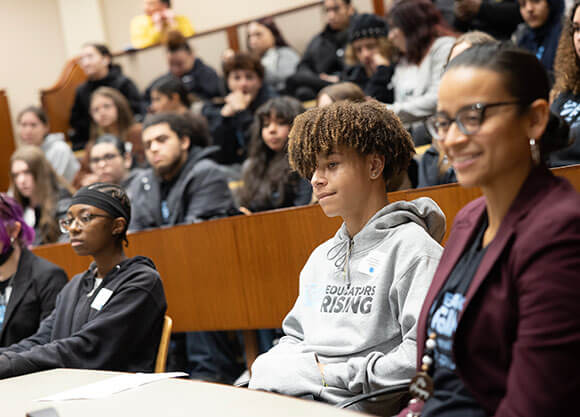
High school students urged to find their superpowers
November 18, 2022

November 18, 2022

The students, selected through the State Department of Education’s Educators Rising program, gathered at the North Haven campus for Brown-Dean’s presentation and a series of panel discussions chaired by various in-state dignitaries from the educational community. The discussion was centered around successful transitions from high school to higher education but the overarching message was about representation and breaking down barriers at a time when there is already an urgent demand for quality teachers.
“I loved comic books. I was fascinated by the stories of the Green Lantern and Shang-Chi,” said Brown-Dean, author of the 2019 book “Identity Politics in the United States” and the host of Connecticut Public Radio’s “Disrupted” podcast. “I was fascinated that these superheroes always showed up when people needed them — even before the people knew that they needed them.
“The beauty of comics at the time was that you could explore these worlds beyond where you were. And if you really looked carefully, you could find these superheroes and characters who looked like you. People who represented diversity, whether they were green people or blue people.”
Teachers, like superheroes, can see things before they happen, Brown-Dean said. They can sense a student’s gifts and uncover ambition that might be simmering beneath the surface.
In recounting her own super educator origin story, Brown-Dean said she encountered a villain of sorts: a guidance counselor in rural Virginia who told her she lacked the grades and the discipline to pursue a teaching career. Thankfully, another teacher at the school informed Brown-Dean’s mother about the exchange, setting up a “very lively” conversation that re-routed Khalilah and brought her goals back into focus.
“My mom came out with a stack of applications and said, ‘you're going to apply. You're going to go to college even if you don't get into the school you want,’” Brown-Dean recalled. “She saw something in me that I didn't see in myself. Remember, your destiny, your purpose and your path aren't defined by other people because your worth is not defined by other people.”
Brown-Dean said she was honored to be in the presence of so many young people who had “made the decision that they want to have an impact.” It’s a misnomer to characterize kids as “future leaders,” Brown-Dean said, when in reality the state and the country “don’t have the luxury of waiting for you to be a future leader.”
“We need you right now,” she said.
Brown-Dean’s presentation included a quote from the Academy Award-nominated actor Chadwick Boseman, who died from colon cancer in 2020 after critically acclaimed portrayals of Jackie Robinson and James Brown and the titular role in Marvel’s Black Panther. The difference between a hero and a villain, Brown-Dean said, is using your power for the greater good rather than selfish means.
Teachers wield such power, said State Senator Douglas McCrory, a former teacher and principal with over 30 years of experience who also serves as a co-chair of the state’s education commission. It’s therefore important to call out barriers — in the form of people or systems — that would prevent a student from reaching their potential, McCrory said.
“I think about how many children have had their dreams shattered by terrible educators,” McCrory said. “I just want you guys to know that while you're on this path, you have to understand how important you are in the lives of our children. I look at the research. I study it. All the research in the world says that our children do better — academically and socially — when they're taught by a diverse teaching population.”
Lt. Gov. Susan Bysiewicz cited Gov. Ned Lamont’s past as a teacher at Harding High School in Bridgeport as one of the reasons the administration is so invested in supporting initiatives like Educators Rising. Citing a quote from former U.S. Secretary of Education Richard Riley, she said that “teachers should look like America.”
Fran Rabinowitz, the executive director of the Connecticut Association of Public School Superintendents, said she was inspired by the diversity on display in a packed auditorium in the Medicine, Nursing and Health Sciences building.
“You are the future influencers, and the diversity here today just makes my heart sing because I know how important it is to have caring people in front of our children who also look like them,” she said. “It just does my heart good to be here today, and I hope that you stick with your journey to be an educator.”
Education Rising has 350 students enrolled in 18 clubs across the state, according to Connecticut Commissioner of Education Charlene Russell-Tucker. Connecticut has seen an uptick in the number of educators who identify as people of color, to 10%, she said, but the conversation is just beginning.
“We need all of you today to accomplish these goals, and we need all of you so we can change the face of education in Connecticut and be the change agents to prepare future generations,” Russell-Tucker said.
She added that the state education commission is currently collaborating with the Connecticut State College and University system to develop and implement a new education pathway program designed to support high school students interested in a career in education. Those students will be able to take dual-credit courses in high school that are transferable to both community colleges and four-year institutions, Russell-Tucker said. Additional resources were discussed during the panel discussions, which were facilitated by student leaders.
Quinnipiac Today is your source for what's happening throughout #BobcatNation. Sign up for our weekly email newsletter to be among the first to know about news, events and members of our Bobcat family who are making a positive difference in our world.
Sign Up Now